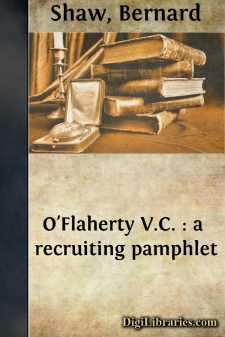Categories
- Antiques & Collectibles 13
- Architecture 36
- Art 48
- Bibles 22
- Biography & Autobiography 813
- Body, Mind & Spirit 142
- Business & Economics 28
- Children's Books 17
- Children's Fiction 14
- Computers 4
- Cooking 94
- Crafts & Hobbies 4
- Drama 346
- Education 46
- Family & Relationships 57
- Fiction 11829
- Games 19
- Gardening 17
- Health & Fitness 34
- History 1377
- House & Home 1
- Humor 147
- Juvenile Fiction 1873
- Juvenile Nonfiction 202
- Language Arts & Disciplines 88
- Law 16
- Literary Collections 686
- Literary Criticism 179
- Mathematics 13
- Medical 41
- Music 40
- Nature 179
- Non-Classifiable 1768
- Performing Arts 7
- Periodicals 1453
- Philosophy 64
- Photography 2
- Poetry 896
- Political Science 203
- Psychology 42
- Reference 154
- Religion 513
- Science 126
- Self-Help 84
- Social Science 81
- Sports & Recreation 34
- Study Aids 3
- Technology & Engineering 59
- Transportation 23
- Travel 463
- True Crime 29
Bernard Shaw's Preface to Major Barbara
by: Bernard Shaw
Categories:
Description:
Excerpt
BERNARD SHAW
N.B. The Euripidean verses in the second act of Major Barbara are not by me, or even directly by Euripides. They are by Professor Gilbert Murray, whose English version of The Baccha; came into our dramatic literature with all the impulsive power of an original work shortly before Major Barbara was begun. The play, indeed, stands indebted to him in more ways than one.
G. B. S.
Before dealing with the deeper aspects of Major Barbara, let me, for the credit of English literature, make a protest against an unpatriotic habit into which many of my critics have fallen. Whenever my view strikes them as being at all outside the range of, say, an ordinary suburban churchwarden, they conclude that I am echoing Schopenhauer, Nietzsche, Ibsen, Strindberg, Tolstoy, or some other heresiarch in northern or eastern Europe.
I confess there is something flattering in this simple faith in my accomplishment as a linguist and my erudition as a philosopher. But I cannot tolerate the assumption that life and literature is so poor in these islands that we must go abroad for all dramatic material that is not common and all ideas that are not superficial. I therefore venture to put my critics in possession of certain facts concerning my contact with modern ideas.
About half a century ago, an Irish novelist, Charles Lever, wrote a story entitled A Day's Ride: A Life's Romance. It was published by Charles Dickens in Household Words, and proved so strange to the public taste that Dickens pressed Lever to make short work of it. I read scraps of this novel when I was a child; and it made an enduring impression on me. The hero was a very romantic hero, trying to live bravely, chivalrously, and powerfully by dint of mere romance-fed imagination, without courage, without means, without knowledge, without skill, without anything real except his bodily appetites. Even in my childhood I found in this poor devil's unsuccessful encounters with the facts of life, a poignant quality that romantic fiction lacked. The book, in spite of its first failure, is not dead: I saw its title the other day in the catalogue of Tauchnitz.
Now why is it that when I also deal in the tragi-comic irony of the conflict between real life and the romantic imagination, no critic ever affiliates me to my countryman and immediate forerunner, Charles Lever, whilst they confidently derive me from a Norwegian author of whose language I do not know three words, and of whom I knew nothing until years after the Shavian Anschauung was already unequivocally declared in books full of what came, ten years later, to be perfunctorily labelled Ibsenism. I was not Ibsenist even at second hand; for Lever, though he may have read Henri Beyle, alias Stendhal, certainly never read Ibsen. Of the books that made Lever popular, such as Charles O'Malley and Harry Lorrequer, I know nothing but the names and some of the illustrations. But the story of the day's ride and life's romance of Potts (claiming alliance with Pozzo di Borgo) caught me and fascinated me as something strange and significant, though I already knew all about Alnaschar and Don Quixote and Simon Tappertit and many another romantic hero mocked by reality....












